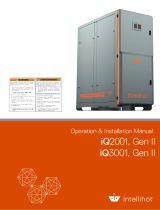
2 Page
CONTENTS
Installation Manual
SPECIFICATIONS ......................................................................2
INTRODUCTION .....................................................................4
SAFETY GUIDELINES..............................................................6
SAFETY DEFINITION ............................................................6
GENERAL ..............................................................................6
INSTALLATION .........................................................................7
GENERAL ..............................................................................7
CLEARANCES ............................. ...........................................9
INCLUDED ACCESSORIES ....................................................9
OPTIONAL ITEMS ................................................................9
WARNING FOR INSTALLATIONS .......................................11
OUTDOOR INSTALLATIONS...............................................12
Clearances ........................................................................12
INDOOR INSTALLATIONS ..................................................13
Clearances ........................................................................13
Combustion air supply .....................................................13
Direct intake vent system .................................................14
VENTING INSTRUCTIONS .................................................15
General .............................................................................15
Vent length and No. of Elbows .........................................17
Indoor installation diagrams ............................................17
Clearances for sidewall terminations ...............................18
Clearances for rooftop terminations ................................19
Vent termination clearances ............................................20
GAS SUPPLY AND GAS PIPE SIZING .................................21
General .............................................................................21
Gas connections ...............................................................21
Natural gas supply piping .................................................22
Propane (LP) supply piping ...............................................22
WATER CONNECTIONS .....................................................23
Pressure relief valve .........................................................23
ELECTRICAL CONNECTIONS .............................................24
REMOTE CONTROLLER CONNECTION .............................24
EXTERNAL FAN MOTOR CONNECTION ............................25
PUMP CONTROL CONNECTIONS .....................................25
Pump control mode .........................................................25
TWO UNIT PRIORITY .........................................................26
.................................................................... 27
Easy link connection procedures ......................................27
................................................................ 29
APPLICATIONS ....................................................................... 30
SPACE HEATING APPLICATIONS .......................................30
RECIRCULATION ................................................................30
..............................31
INITIAL OPERATION ..............................................................32
Owner's Guide
OPERATING SAFETY ..............................................................34
NORMAL OPERATION ...........................................................36
GENERAL ............................................................................36
WITH REMOTE CONTROLLER ...........................................36
Set temperature ...............................................................37
Temperature tables of controller .....................................37
Other functions ................................................................37
TEMPERATURE SETTINGS ON THE COMPUTER BOARD ........38
FLOW ...................................................................................39
FREEZE PROTECTION SYSTEM ..........................................39
MAINTENANCE AND SERVICE .......................................... 39
Measuring inlet gas pressure ...........................................40
UNIT DRAINING AND FILTER CLEANING ............................. ...40
TROUBLESHOOTING..............................................................41
GENERAL ............................................................................41
ERROR CODES ....................................................................43
General .............................................................................43
Error code display .............................................................43
Easy-Link System ..............................................................43
Fault analysis of error code ..............................................44
COMPONENTS DIAGRAM .....................................................46
PARTS LIST ............................................................................. 50
OUTPUT TEMPERATURE CHART ...........................................52
SPECIFICATION
Natural Gas Input
(Operating Range)
BTU/H
Min: 15,000 BTU/h
Max: 380,000 BTU/h
Propane Input
(Operating Range)
BTU/H
Min: 15,000 BTU/h
Max: 380,000 BTU/h
Gas Connection 1” NPT
Water Connections 1” NPT
Water Presure* psi
(Mpa)
15 - 150 psi*
(0.1 - 1.0 Mpa)
Natural Gas
Inlet pressure
" W.C.
(kPa)
Min.: 4” W.C.(1.00 kPa)
Max.: 10.5” W.C.(2.61 kPa)
Propane Gas
Inlet pressure
" W.C.
(kPa)
Min.: 8” W.C.(1.99 kPa)
Max:. 14” W.C.(3.48 kPa)
Weight lbs.
(kg)
Dimensions Inch
(mm)
H 25.3 in. (643mm) ×
W 24.8 in. (630mm) ×
D 11.8 in. (300mm)
Ignition Electric Ignition
Electric
Supply
VAC/Hz
120 VAC/60 Hz
Consumption
Operation
W/A 178 W (1.48 A)
Stanby
W/A 16 W (0.13 A)
Freeze-
Protection
W/A 271 W (2.26 A)
Category Category III
*40 psi (0.28 Mpa) or above is recommended for
maximum flow.
**Water heater Category — water heaters of other than
direct vent type, for outdoor installation, are divided into
four categories based on static pressure produced in the
vent and flue loss.
Category I - a water heater that operates with a non-
positive vent static pressure and with a vent gas
temperature that avoids excessive condensate pro-
duction in the vent.
Category II - a water heater that operates with a non-
positive vent static pressure and with a vent gas
temperature that may cause excessive condensate
production in the vent.
Category III - a water heater that operates with a posi-
tive vent static pressure and with a vent gas tempera-
ture that avoids excessive condensate production in
the vent.
Category IV - a water heater that operates with a posi-
tive vent static pressure and with a vent gas tempera-
ture that may cause excessive condensate produc-
tion in the vent.
***These are equivalent lengths that include head loss
for elbows, tees, unions, etc.
NOTE:
-
uct matches your specifications.
The manufacturer reserves the right to discon-
tinue, or change at any time, specifications or
designs without notice and without incurring
obligation.
Contents




















